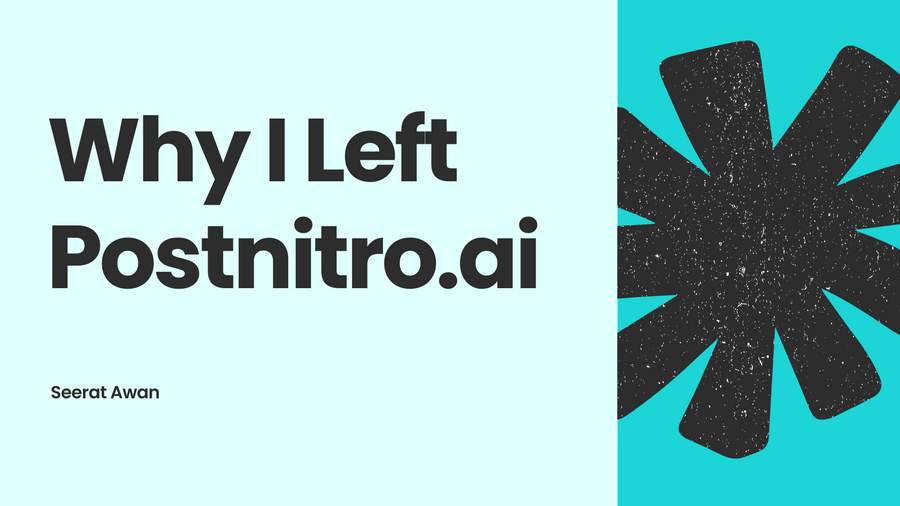· 7 min read
Why I Left Postnitro: A Co-Founder's Honest Reflection
An inside look at my journey co-founding Postnitro, building the core technology, and the difficult decision to move on.

This is my personal story about co-founding and eventually stepping away from Postnitro, the AI carousel generator that started as a side project and grew into a real platform. It was one of the most challenging and educational chapters of my professional journey, teaching me valuable lessons about product development, partnership dynamics, and personal boundaries.
It’s been few days since I left Postnitro, and I’m documenting this experience primarily for clarity both for myself and for others who might find themselves in similar situations. This isn’t about drama or blame. It’s an honest reflection on what worked, what didn’t, and what the experience taught me about building companies and understanding my own professional needs.
Building Postnitro: The Technical Foundation
I built Postnitro’s entire core system in just a few months while working full-time day job. The AI carousel generator, browser extension, rendering engine, and embed SDK, every current critical component was designed and developed by me during late nights and weekends. Later, another partner joined and contributed valuable editor features and additional controls, but the architectural foundation came from those countless hours carved out after long workdays.
Was Postnitro a groundbreaking invention? No, It was just a better clone of an existing platform and I was comfortable with that reality. The startup world often romanticizes originality, but execution, speed, and genuine utility typically determine success. We had clear market demand, the technical skills to address it, and we moved quickly. I focused on building something functional and genuinely helpful rather than chasing the myth of disruption.
Postnitro addressed a genuine market need. We identified this pain points and had the technical capability to deliver an automated solution that could save creators significant time and effort.
Partnership Challenges: Equity vs. Contribution
There were four of us. Two were expected to help build the team, scale the business, and manage operations. But beyond contributing a few thousand dollars, their involvement remained minimal. Looking back, maybe it was a communication issue, maybe the roles and expectations weren’t clearly defined from the start. But even so, just putting in that amount of money doesn’t justify holding 50% of the company when others are putting in all the time, sweat, and execution. That’s not real partnership. That’s more like passive investment. And there’s a big difference. What truly defines a partner is consistent effort, ownership, and accountability.
The one partner with the CEO “tag”, was a close friend who put in full-time work and brought energy to the project. But somewhere along the way, the focus shifted. Being CEO became more of a personality trait than a functional role. Discussions quickly turned into arguments. There was little room for collaboration or diverse opinions. It became more like ego clashing, from his side and, I’ll admit, from mine as well.
This dynamic was particularly challenging given my continued technical leadership while maintaining a full-time job. Despite my foundational contributions and ongoing development work, I felt more like an employee than a co-founder in my own company.
Personal Limits and Burnout Recognition
One big thing I’ve learned about myself is this: I can deliver projects for clients or teams without feeling deeply invested. But if I’m building something I’m supposed to own, I need that personal connection. If it fades, the work becomes mechanical. And when that happens, the quality and joy both suffer.
At some point, I had already lost the passion for Postnitro. Around that same time, I also hit a phase where I needed some financial breathing room, especially since I had never asked for or earned anything from Postnitro. So I turned back to freelancing. It wasn’t part of the original plan, but it ended up being exactly what I needed. Through skill and consistency, I pulled through that tough period, and in the process, regained a strong sense of confidence in my ability to stand on my own.
But during that stretch, I was juggling a full-time job, client work in the evenings, and Postnitro. And if I’m being honest, Postnitro became the last thing I wanted to open. It no longer felt important. It wasn’t personal anymore. It didn’t carry meaning, and without meaning, it simply couldn’t compete for my time or energy.
During that time, I also experienced intense burnout. The kind that creeps up when you’re constantly switching between multiple responsibilities, without pause. The sleepless nights, the lack of rest, the emotional drain and it all added up. I was operating on autopilot, and I knew that wasn’t going to work for much longer.
Walking Away Clean
Eventually, I made the decision to step away. The truth is, I had lost passion for the project long before I actually left. I was still contributing and still building here and there, but my heart wasn’t in it anymore, and I knew that neither the company nor I would benefit from continuing that arrangement.
The exit was handled professionally and respectfully. There was no drama. No fights. No drawn-out exit talks. I left quietly and respectfully. I even settled for peanuts compared to what my contribution was worth, because I didn’t want to carry any baggage with me. Peace of mind mattered more than chasing numbers.
Postnitro continues operating and growing, which I genuinely support. My departure wasn’t about the company’s potential; it was about recognizing that my role within it no longer aligned with my professional needs or personal values.
Lessons Learned: Professional and Personal Growth
This experience reinforced several key lessons about startups, partnerships, and personal well-being:
Equity should reflect contribution. When capital outweighs effort, imbalance is inevitable. Future ventures must define fair equity distribution from the start.
Partnerships go beyond roles. Shared values, communication styles, and decision-making approaches matter as much as skills. They shape whether a team can truly build together.
Passion must be sustainable. It’s not enough to start with excitement. Projects need space for personal connection, recognition, and alignment or they fade fast.
Burnout isn’t just tiredness, it’s a warning. Recognizing it early and taking action is essential to maintaining not just health, but quality and clarity in your work.
Exiting well is an underrated skill. Leaving at the right time, with self-awareness and grace, can protect relationships and open up better opportunities down the road.
On a personal level, this journey reminded me that we do our part, but outcomes aren’t entirely in our control. Our responsibility is in the effort, not the result. When things don’t align anymore, letting go with dignity can be the most productive step forward.
Moving Forward
Looking at all of this again, the experience reminded me of something deeper: everything is written. Rizq (sustenance), people, and opportunities, they come and go by the will of Allah. We show up, we work hard, we do our best, but we don’t control the end result. And that realization brings a strange kind of peace.
Sometimes a door closes not because you failed, but because it’s time to move on. A quiet redirection. A better path opening where you didn’t expect it. Some things are meant to teach, not to last.
Walking away isn’t a weakness. Sometimes, it’s the clearest and strongest decision you can make, especially when you do it with integrity, without burning bridges, and with your heart still clean. I’m grateful for what Postnitro taught me. And I’m even more grateful to have moved forward with my focus clear and my faith stronger.

Subscribe to my newsletter to get the latest updates on my blog.